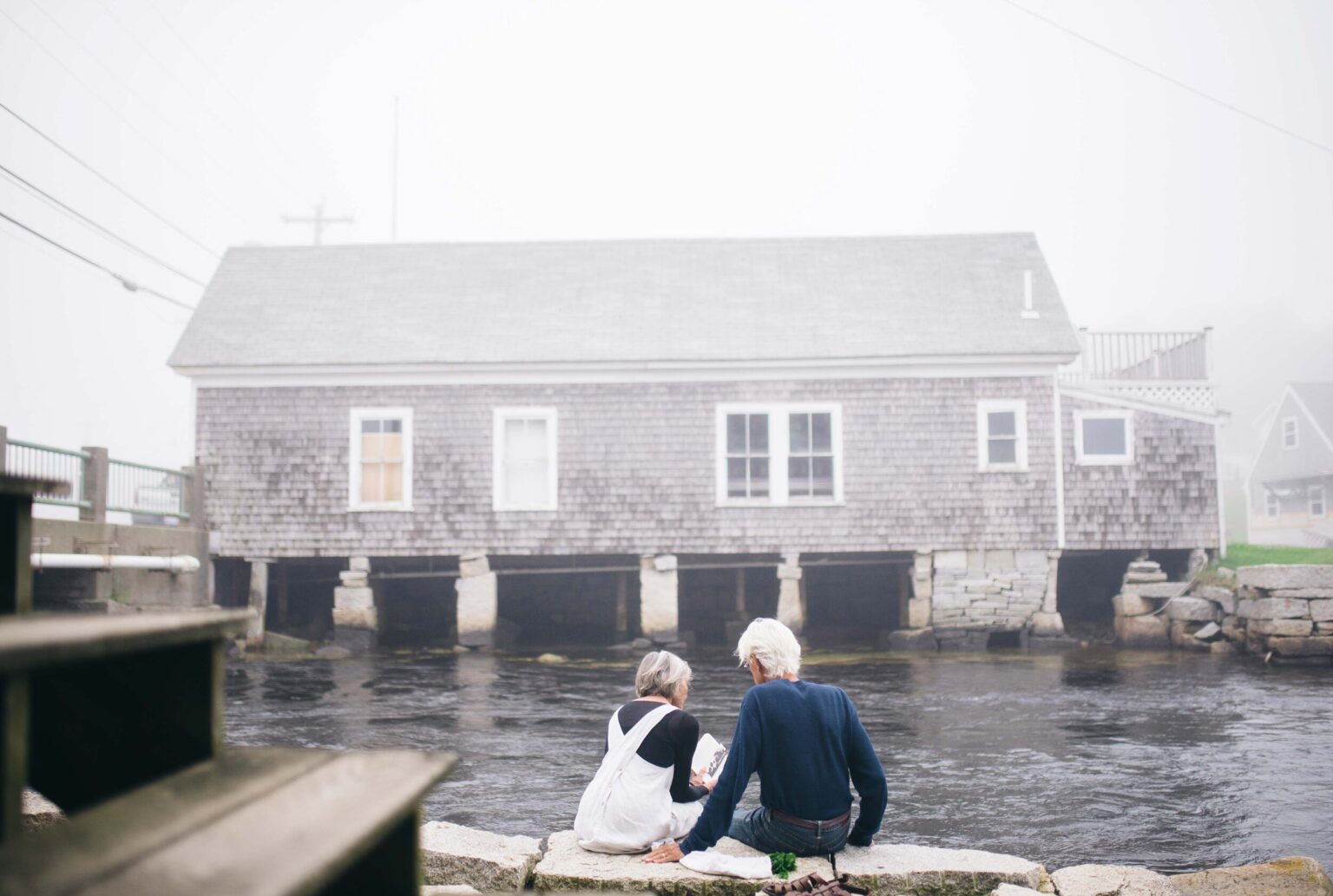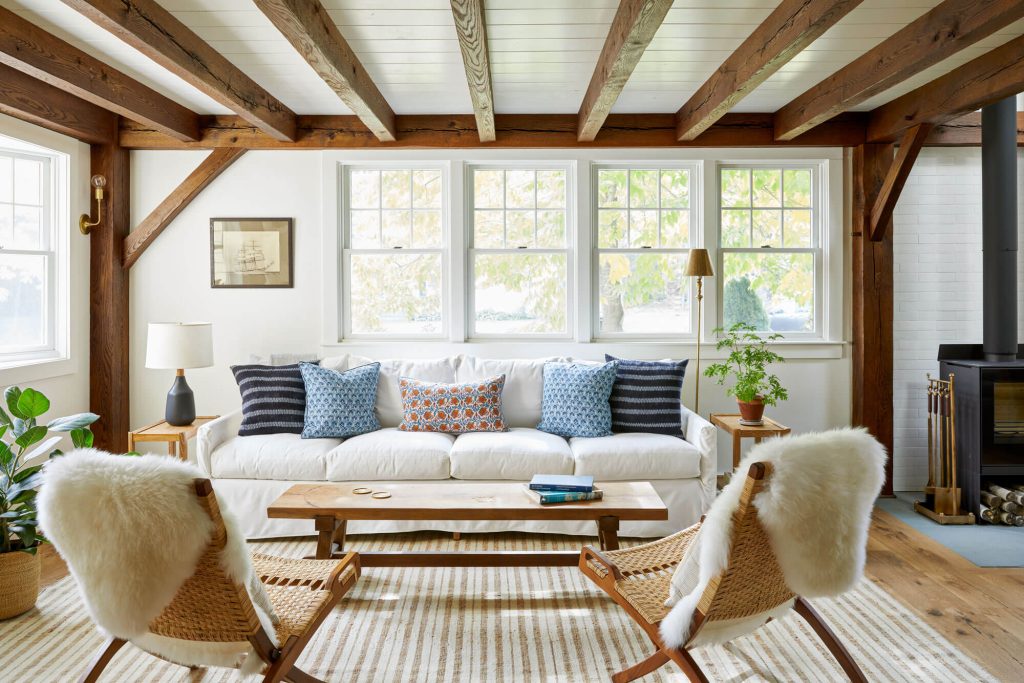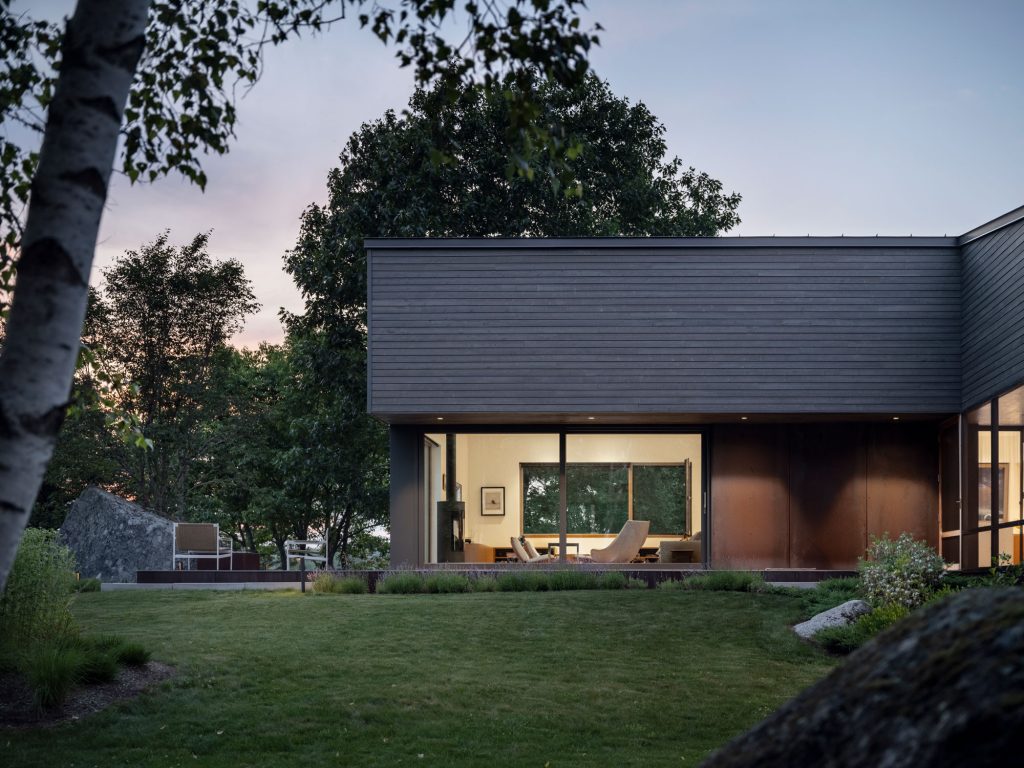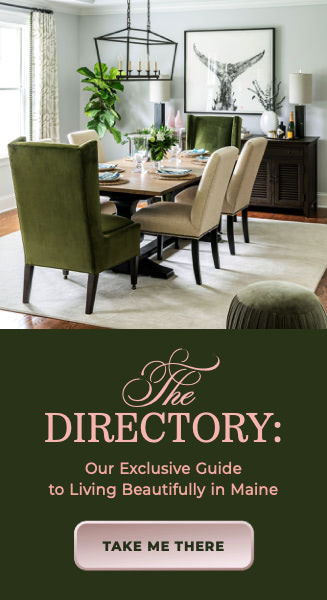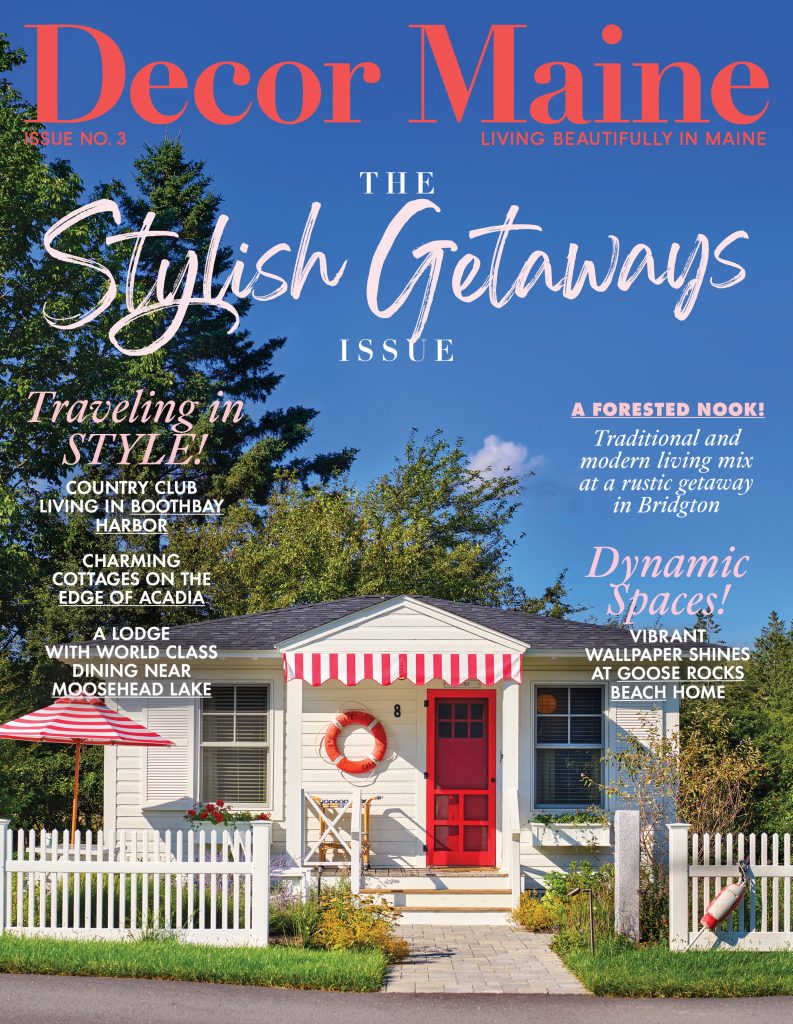As the ferry approaches the island of Vinalhaven through a summer fog, the craggy coast and pine trees appear out of the mist like another realm, a place bewitched. This sensation only continues when I reach the shore and step inside Marston House, the antiques shop and home of Sharon and Paul Mrozinski. Brimming with French and American furnishings, housewares, textiles, clothing, and other enchanting objects, it feels both timeless and charmed. A sign in the window promises: Homespun linen; Useful antiques.
The 1890 shingle-sided building, originally the post office on the nearby isle of North Haven, was transported by barge in 1906 and placed on the granite foundation of the burned-down Cascade House. Among its many lives, it was a gas station, a menswear and dry goods store, and most recently, a paper shop. Now, fully renovated by the Mrozinskis into their shop and home, it encompasses both their life and work. After a browse around the shop, I’m welcomed into their home through a sliding barn door along the shop’s back wall. A short hallway leads to the master bedroom, where a four-poster bed heaped with French linen faces windows that capture the long, blue view of Carver Pond.
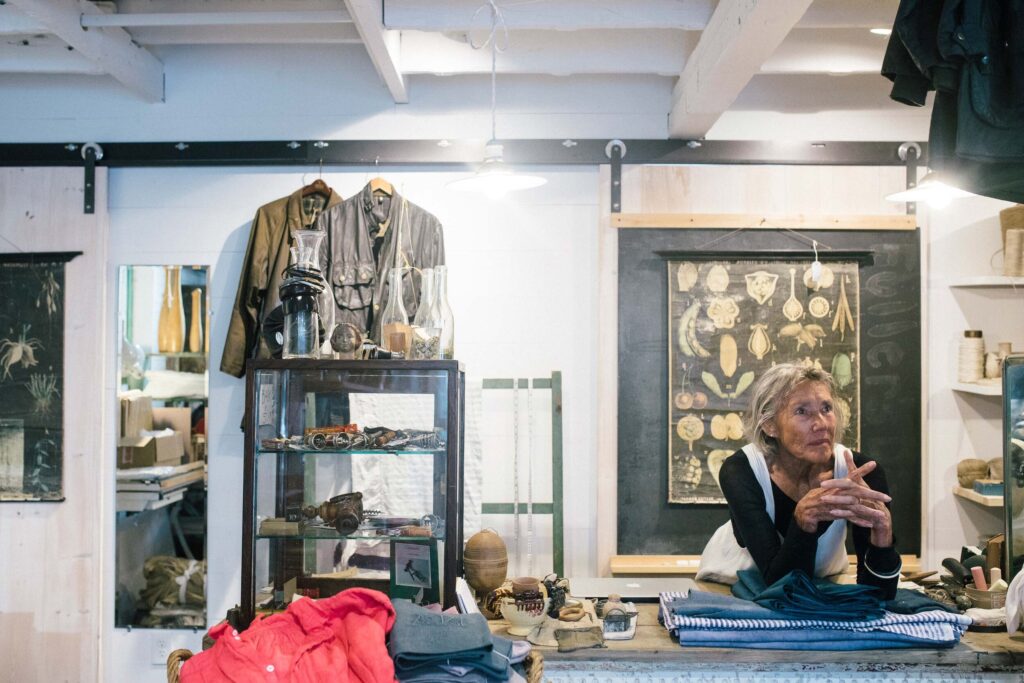
Sharon, an antiques dealer, met Paul, an architect, in 1977, by kismet, when he was hired to do an emergency renovation on her shop in Carmel Valley, California. They were married to others, with young children, at the time, but the seed was planted. In 1987, they reunited, married, and moved to Wiscasset one whirlwind month later. There, they ran a food-and-wine store and Marston House Antiques Shop and B&B from an 18th-century sea captain’s home for nearly 30 years. When they moved to Vinalhaven in 2017, the name came with them.
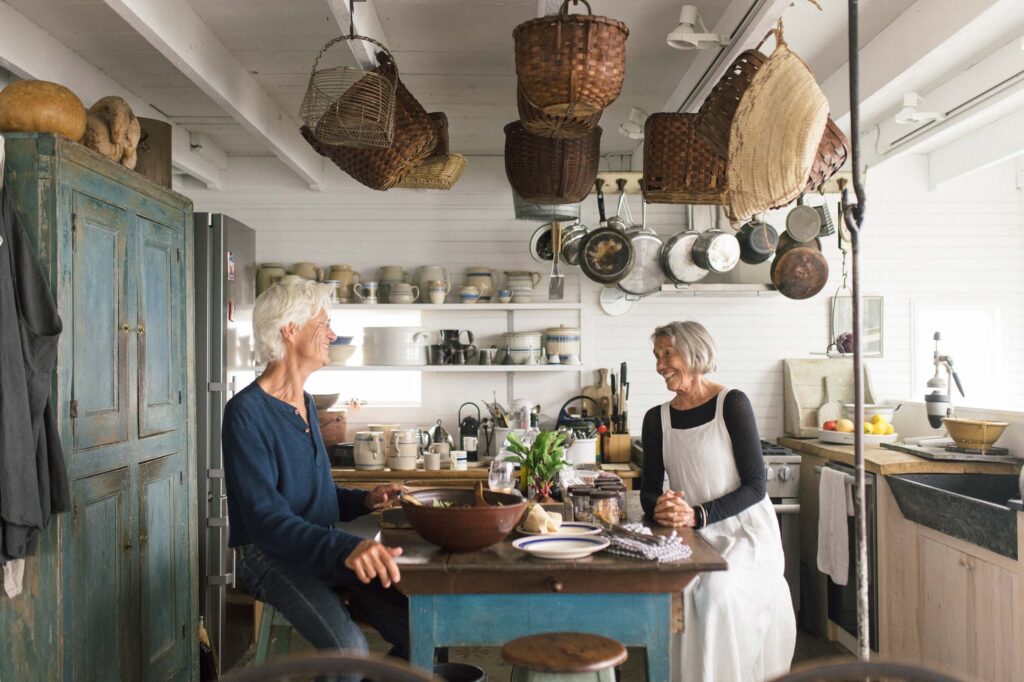
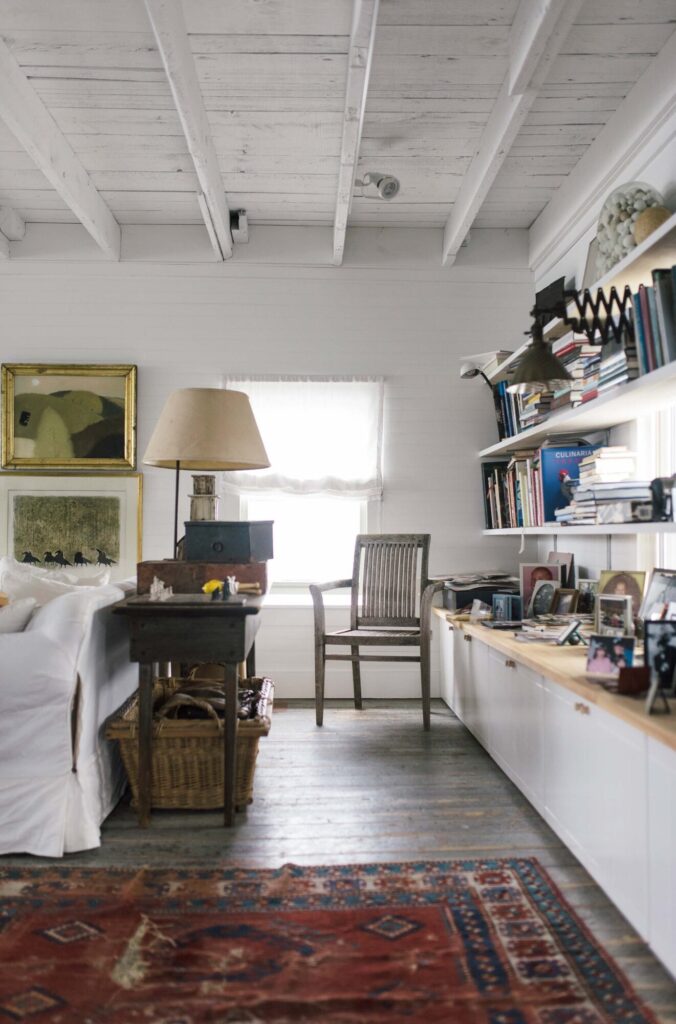
“Sharon brought me to New England for the first time and it opened up a whole new world,” says Paul. “I fell in love with Shaker furniture, the simplicity and functionality of design. Nothing is pretend or make-believe, materials have to be real. That’s another thing that drives our aesthetic. We’re not into trends, not at all. We do it to please ourselves.” Paul drew up the renovation plans and worked with Peter Codella of PC Builders, Vinalhaven, on the 1,500-square-foot building, which they gutted. Among the many improvements, they added a staircase to the second level, originally accessible only from the outside, and casement windows to welcome in the water views. Two bedrooms were removed to open up the upstairs space. Other features, like the handsome wood floors, long hidden beneath layers of old linoleum and shag carpet, merely needed to be uncovered and shined up.
The Mrozinskis, dressed simply in linen, cotton, and silk, make an elegant, striking pair and share a common vision. Where some see tarnish, they see patina, the beauty of well-loved possessions. In this way, they are also remarkably modern. There is hardly anything more sustainable than finding new uses for old things. Paul is attracted to quality materials that stand the test of time. “Nothing phony,” he says. Sharon doesn’t mind if something has a chip in it. “If it’s an extraordinary piece of pottery, I don’t care at all,” she says.
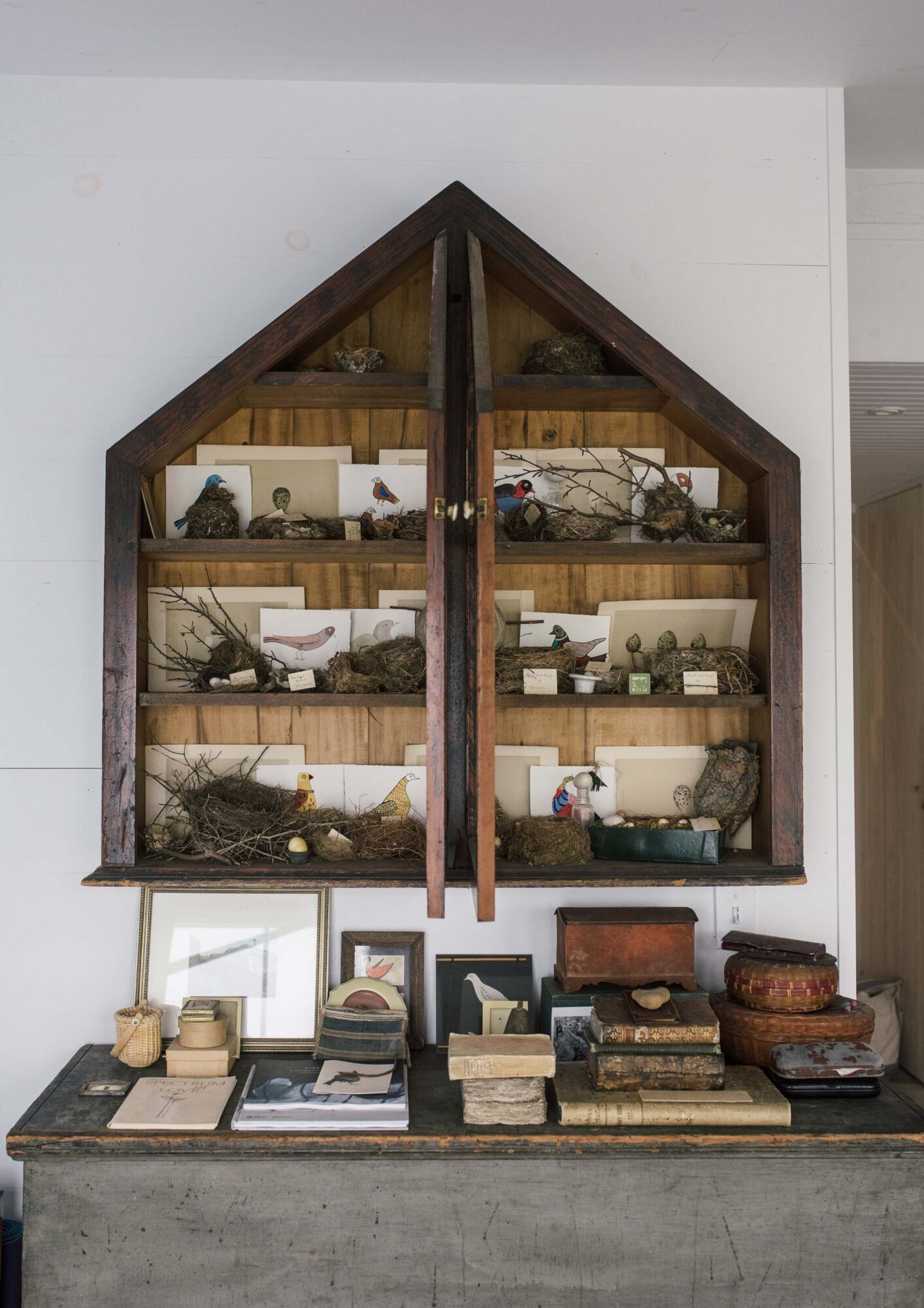
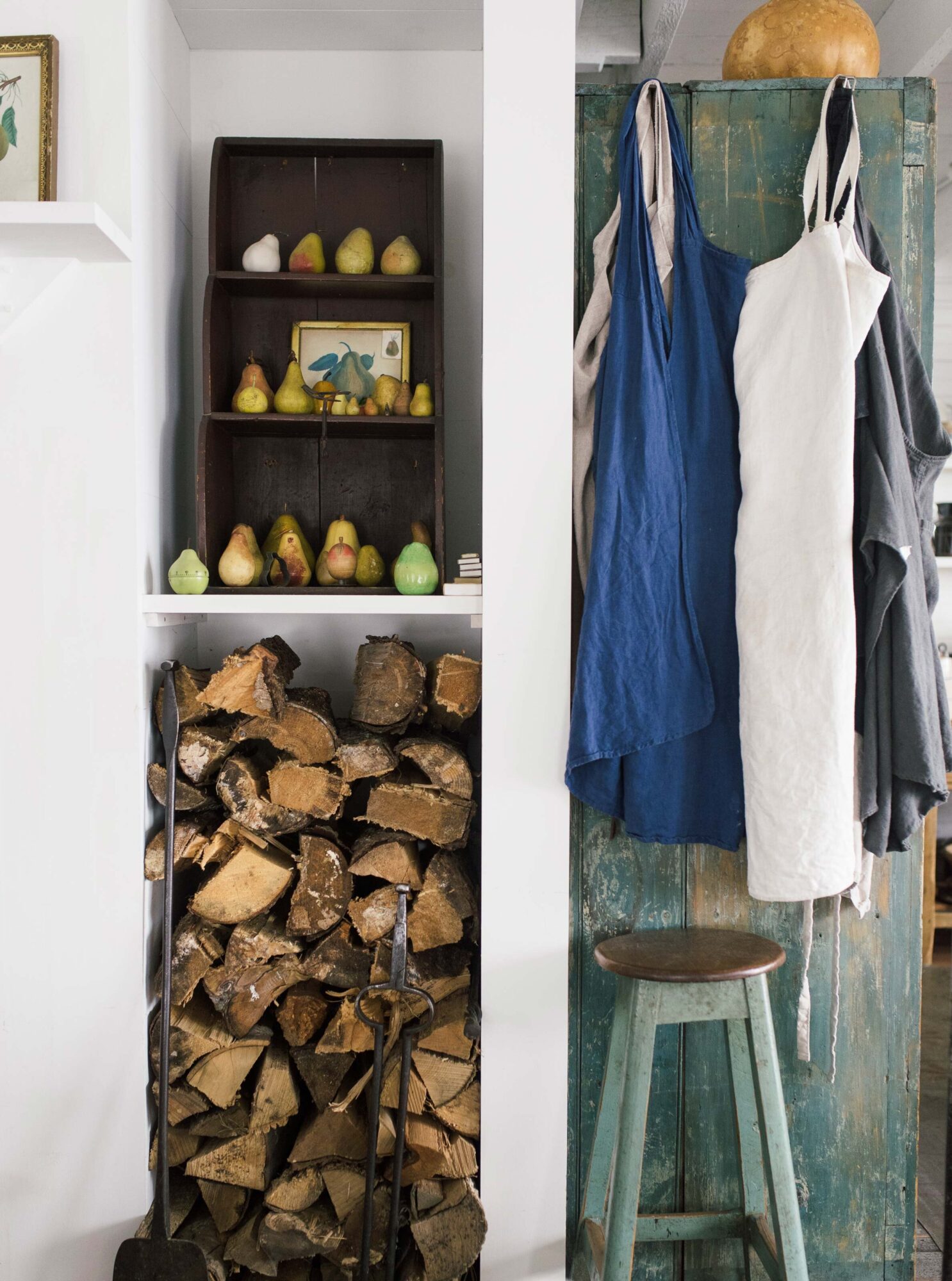
The couple stay May through October on the island. The winter is spent in Bonnieux, a medieval hilltop village in the Luberon region of southern France. From there, they travel through France, Italy, and England, collecting the lion’s share of antiques for the shop, frequenting flea markets and sales but never with an agenda. Sharon relies on intuition. “It is almost a force, a pull,” she explains. “It’s totally instinct. It’s like falling in love.”
Their home is likewise filled with beautiful collections and careworn keepsakes. In fact, they don’t sell anything they wouldn’t choose to live with themselves, and often do.
“We buy for the shop what we would have in our home,” notes Paul.
“Everything that we buy, we’ve fallen in love with and want to share,” Sharon agrees. “We will ask ourselves, ‘Can we live with this for the rest of our lives?’ Because not everything does sell. And, indeed, we could.”
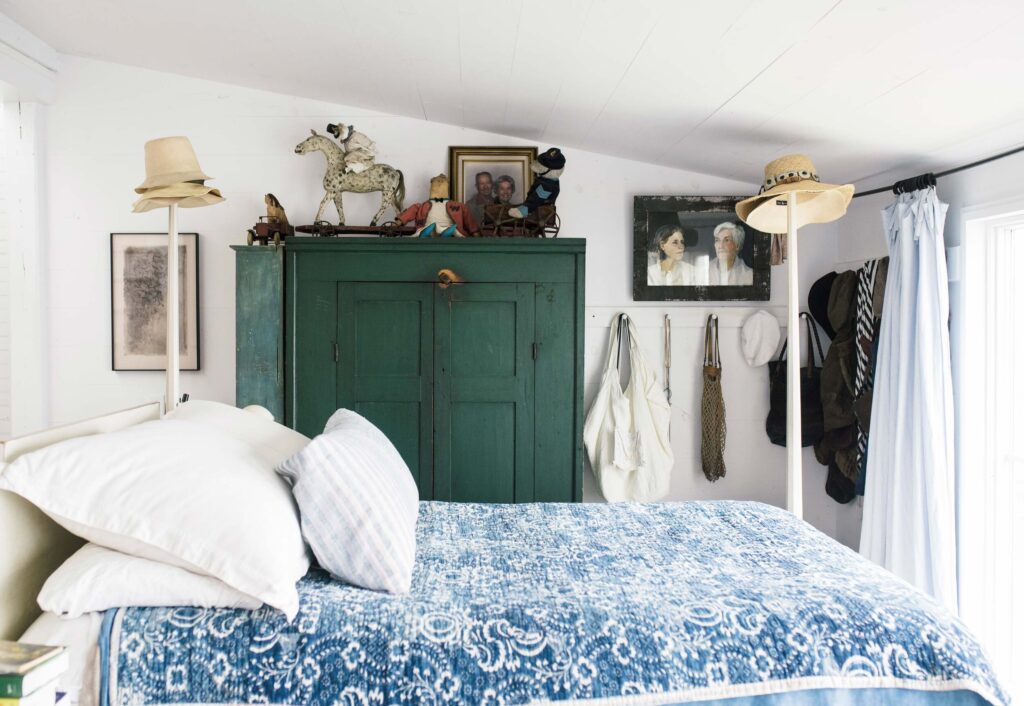
Sharon had a modest childhood in Arizona. Paul was one of seven children of a Polish family in Chicago. Sharon credits her upbringing with honing her eye. “We were both brought up humbly. My dad pumped gas, basically. I grew up in a trailer and my playground was sort of a dump, which I loved. I had a really free childhood. I think I just developed an aesthetic that was extremely simple, practical, and useful. I’ve always been attracted to peasant things, not richness. The richness really is in the heart, not in my pocket.”
She enjoys feeling the “hand” of antique fabrics that have been washed and worn, torn and mended, to a softness that comes only with age. The items in her shop feel soulful, like good company. And while Sharon wouldn’t call the place haunted—the feeling is more benevolent than that—her eyes flash with humor as she says, “I’m never alone in that shop, ever. Not in a woo-woo way but in a spiritual way, the pieces just live.”
Up a narrow staircase of whitewashed pine is the living room, office, and kitchen, where Shaker baskets hang from the rafters and antique American crockery pitchers line the shelves. In the dining area, a 19th-century English library table is surrounded by Windsor chairs and topped by a wrought-iron candelabra. White-painted roof beams and walls of beadboard and shiplap keep the open-concept dining and living space feeling airy and bright, a calm, clean backdrop to their art and antiques. “There isn’t one square inch of Sheetrock,” Paul points out. In the living room, the fireplace is a metal zero-clearance insert by Majestic, which allows them to grill indoors. “A fireplace is the soul of the house,” says Sharon. “And for us, a necessity.”
They cleverly maximized the interior, shortening a bathroom to expand the office, and utilized the space all the way to the rafters. An attic sleep loft is reached via a tapered orchard ladder (When I hesitate between rungs, Sharon urges, “You just have to go for it!”) and offers a cozy combination of L.L. Bean camp cots, Aerobeds, and vintage quilts to accommodate the visits of their four grown children and seven grandchildren. Overhead, blackened rafters tell the tale of a long-ago fires. Characteristically, the Mrozinskis left them as is—the darkened beams remind them of Japanese soot paint.
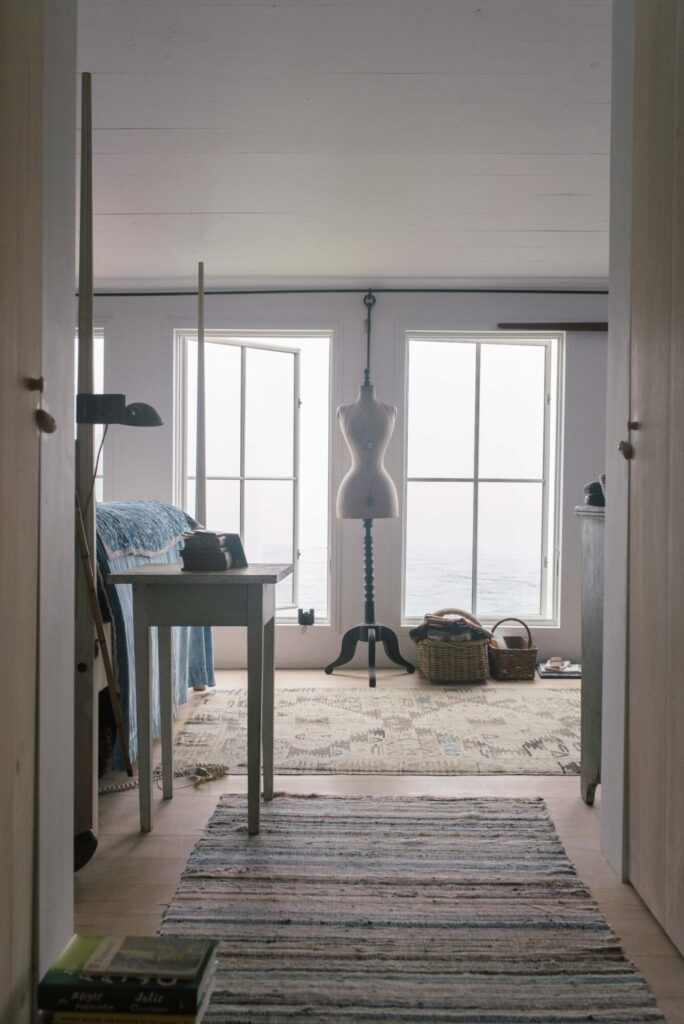
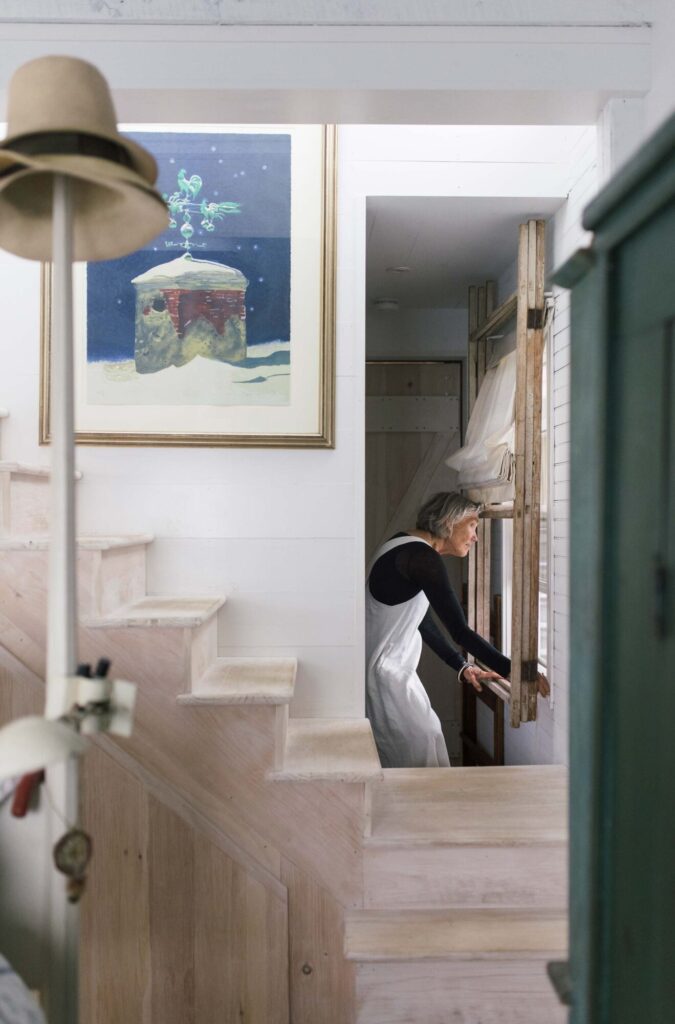
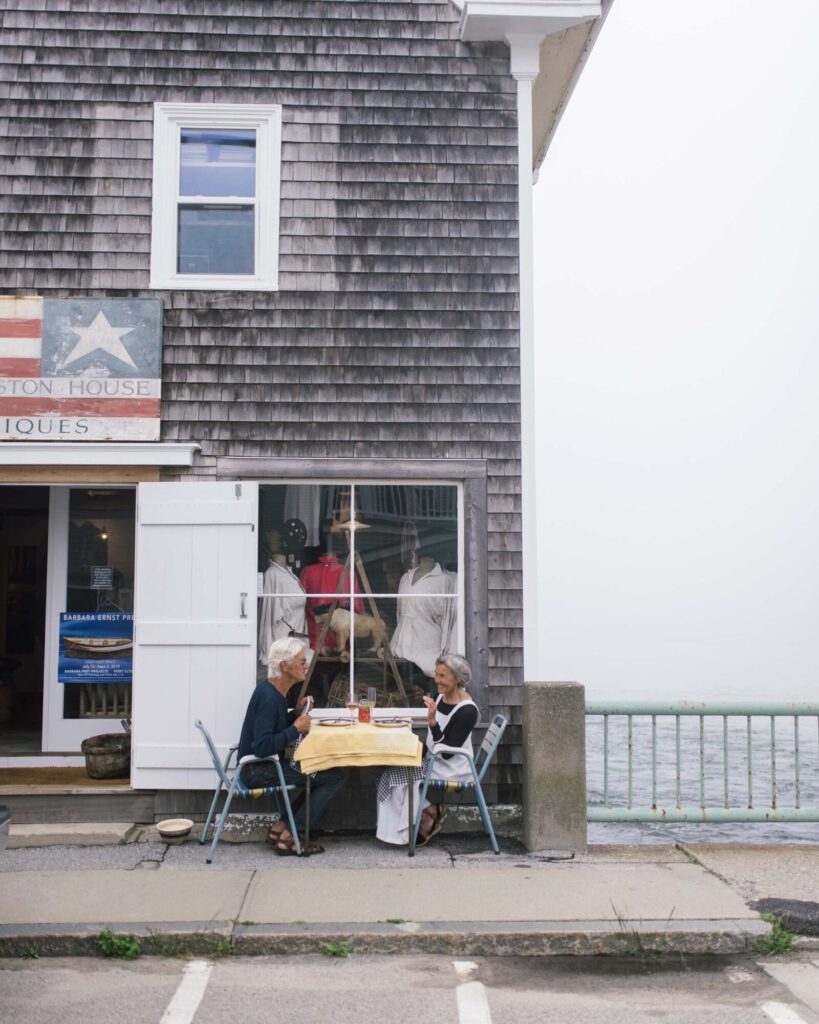
Off the dining area, through a set of French doors, is a deck for alfresco meals and relaxation. If the shop is a nerve center in town, populated with their latest finds and the greetings of neighbors stopping by as they pass—the Mrozinskis’ home is the heart—a place to retreat and recharge. Here, overlooking Carver Pond, a tidal pool that rushes and ebbs, they sip glasses of rosé and speak warmly of their love for island life. They don’t mind a late ferry or a little fog; to them it is part of what makes island living authentic and rewarding. “I always say Maine chooses you as much as you choose Maine,” remarks Sharon. “If you come for the wrong reasons, to fill your pockets, it’s not going to happen. You come to Maine because you really love Maine. You’re not in it for the wealth. You aren’t in it for the riches. I really believe that Maine does choose us. It’s a powerful thing.”
